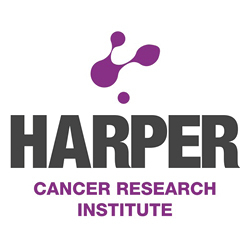

Sharing research across multiple scientific platforms is the foundation on which the Harper Cancer Research Institute was built. This collaborative approach to discovering new treatments to difficult cancers was clearly evident at the recent Pancreatic Cancer Awareness Symposium.
On November 15 2013, more than 50 people gathered—scientific researchers, Notre Dame faculty, students, and members of cancer support services organizations—to focus on the challenges of pancreatic ductal adenocarcinoma (PDAC). PDAC is one of the deadliest of all cancers, with a five-year survival rate of 6 percent and an overall median survival of less than one year. It is the fourth leading cause of cancer-related deaths in the United States. On this day, researchers presented abstracts on several recent breakthroughs in battling pancreatic cancer, and heard a keynote address from Murray Korc, the Myles Brand Professor of Cancer Research at Indiana University School of Medicine.
The symposium was organized by Reginald Hill, Archibald Assistant Professor of Cancer Biology at Harper. Hill’s intent was to highlight the quality of research being conducted not only by scientists at Harper, but also throughout Indiana.
“We wanted to showcase the really exciting work being done here at Notre Dame,” he said, “especially the results that are coming from the collaboration between Notre Dame and other cancer researchers. It was great to bring people’s attention to the diseases that we study.”
While the progresses made in research were the stars of the day-long symposium, one of the event’s most powerful moments happened early on. The symposium began with a brief message from a pancreatic cancer survivor. “Ned” (a pseudonym) shared his story of diagnosis and treatment. When Ned was diagnosed with end-stage PDAC earlier this year, he recognized he and his doctors caught the disease late and knew the odds for survival were minuscule. Ultimately he agreed to an aggressive clinical trial that performed remarkably well, changing Ned’s prognosis from Stage 4 PDAC to no evidence of disease. He was lucky, and his personal journey brought to the forefront the importance of delving deeper into PDAC research—primarily to catch the disease earlier.
“It’s a common occurrence among researchers—that we get so involved in the very specific protein that we study, it becomes all that we focus on. It’s easy then to lose sight of the face that will benefit from our research,” said S. Andrew Bullock, Ph.D., associate director of Harper. “Ned’s presentation jolts us back to understanding why we are doing the research, and why we must continue to diagnose PDAC much earlier. It’s all about collaborating with other scientists to share what we learn so we can develop effective treatments faster.”
Bullock is pleased with the turnout at Harper’s first collaborative symposium. He says they already have another one scheduled in the spring, this time focusing on another cancer with a high mortality rate: ovarian cancer. They are considering another pancreatic symposium in the fall of 2014.
For more information on the research breakthroughs discussed at the Pancreatic Cancer Awareness Symposium, contact Reginald Hill. For further information on any of the research being conducted at the Harper Cancer Research Institute, call 574-631-4100.
Originally published by at harpercancer.nd.edu on February 03, 2014.